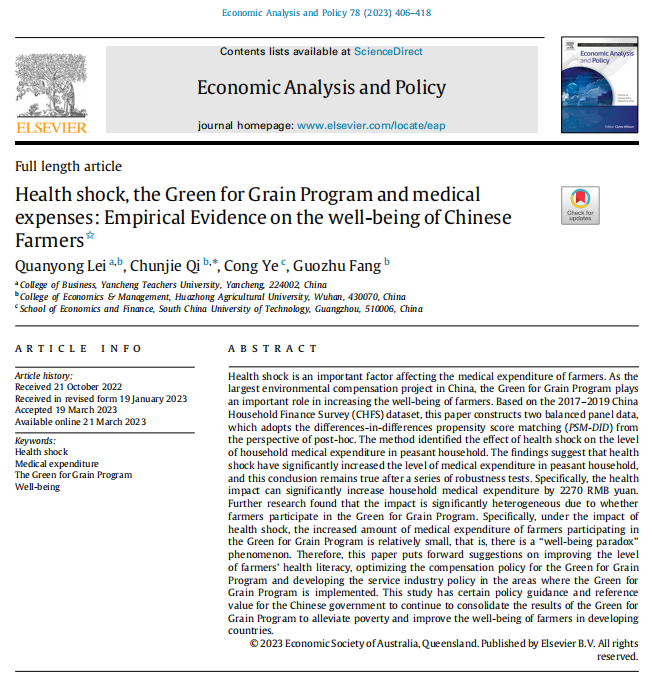近日,我校新葡的京集团8814祁春节教授、博士研究生雷权勇、方国柱以及华南理工大学叶聪博士以“Health shock, the Green for Grain Program and medical expenses: Empirical Evidence on the well-being of Chinese Farmers”为题在国际期刊Economic Analysis and Policy发表研究成果。该研究发现,健康冲击会显著地增加农户的医疗支出水平,但该效应因农户是否参与退耕还林项目而具有异质性。具体而言,在健康冲击下,参与退耕还林农户医疗支出的增加份额相对较少,即存在“幸福悖论”现象。
健康冲击是影响农户医疗支出的重要因素。与此同时,作为当今世界最大的环境补偿项目,退耕还林政策对农户的福祉水平具有重要的影响作用。基于2017-2019年中国家庭金融调查数据集(CHFS),该研究通过构建两期平衡面板数据,采用双重差分倾向得分匹配法探究了健康冲击对农户医疗支出水平的因果效应。该研究结果表明,相比没有参与退耕还林的农户群体而言,参加退耕还林项目的农户因健康冲击所增加的医疗支出相对较少。为此,该研究提出了包括进一步提升农户健康认知水平以及优化退耕还林补偿机制等相关政策建议。该研究不仅丰富了健康冲击对农户福利影响的相关研究,而且为我国进一步巩固农户退耕还林脱贫成果提供了路径启示和政策参考。
新葡的京集团8814博士研究生雷权勇为论文的第一作者,新葡的京集团8814祁春节教授为该研究成果的通讯作者,新葡的京集团8814博士研究生方国柱以及华南理工大学叶聪博士参与了此项研究。
通讯员:雷权勇 审核:李谷成
Abstract
Health shock is an important factor affecting the medical expenditure of farmers. As the largest environmental compensation project in China, the Green for Grain Program plays an important role in increasing the well-being of farmers. Based on the 2017–2019 China Household Finance Survey (CHFS) dataset, this paper constructs two balanced panel data, which adopts the differences-in-differences propensity score matching (PSM-DID) from the perspective of post-hoc. The method identified the effect of health shock on the level of household medical expenditure in peasant household. The findings suggest that health shock have significantly increased the level of medical expenditure in peasant household, and this conclusion remains true after a series of robustness tests. Specifically, the health impact can significantly increase household medical expenditure by 2270 RMB yuan. Further research found that the impact is significantly heterogeneous due to whether farmers participate in the Green for Grain Program. Specifically, under the impact of health shock, the increased amount of medical expenditure of farmers participating in the Green for Grain Program is relatively small, that is, there is a “well-being paradox” phenomenon. Therefore, this paper puts forward suggestions on improving the level of farmers’ health literacy, optimizing the compensation policy for the Green for Grain Program and developing the service industry policy in the areas where the Green for Grain Program is implemented. This study has certain policy guidance and reference value for the Chinese government to continue to consolidate the results of the Green for Grain Program to alleviate poverty and improve the well-being of farmers in developing countries.

原文链接:
https://doi.org/10.1016/j.eap.2023.03.015




